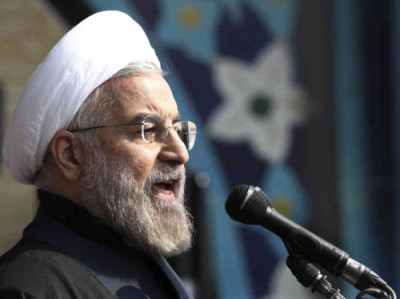- The fight between President Rouhani and his hard-line critics escalated in the past week, as both sides put out challenges over religion and culture.
The campaign against Rouhani reached the Tehran Friday Prayer, as Ayatollah Ahmad Khatami derided the President’s statement that “one cannot take people to heaven through force and a whip”:
A respected official has said that people cannot be put on heaven’s path by force….
If this means that we should leave people to do whatever they want and leave the people free in all moral, political and economic matters to break all limits set by God, this is not supported by anyone in the Islamic regime.
Rouhani hit back the next day, scoffing at religious edicts such as the ruling on baths and showers and criticizing interference in State affairs:
We must not give religion to the administration, religion is in the hands of experts themselves, the clerics, the seminaries, the specialists. It is them who have to propagate religion, the administration must support them, help them, all of this is right.
Despite the President’s rhetoric, there was no sign of a Government push on issues such as hijab and Internet freedom. Instead, members of the Supreme Leader’s inner circle such as Gholam Ali Haddad Adel warned that women must continue to cover their heads, as the West “wants our youth to think about inappropriate sexual relationships, rather than goals related to spirituality”.
In contrast to the cultural fight, a domestic cease-fire was maintained over the nuclear issue. Backed by the Supreme Leader, the Government announced expert-level talks with the 5+1 Powers in advance of the fifth round of discussions on a comprehensive agreement.
Rouhani also celebrated a victory for his strategy of engagement with the Gulf States. The visit of the Emir of Kuwait to Tehran raised the prospect of rapprochement with Saudi Arabia, as well as the rebuilding of economic ties strained by international sanctions.
Meanwhile, the military continued to put out warnings of Iran’s strength. They declared that any US attack on Iran would bring the annihilation of Israel and insisted that the “US empire” was coming to an end.
The Government continued to look for signs of economic recovery, as inflation remained above 30%, but political and economic tensions festered. Iran’s Prosecutor General announced that corruption was rife throughout the Iranian system, with more than 500 officials in Government and the financial sector being interrogated.
FORECAST
President Rouhani’s latest statement indicates that he will not remain passive before hardline attacks; however, the Government is unlikely to go beyond his speeches. Its priority remains economic programs at home and the nuclear talks and regional engagement abroad.
That situation continues to pile on importance on the high-level nuclear discussions, which resume on June 16 in Vienna. The Government needs success both for its economic approach, relieving the pressure of sanctions, and for any attempt to open up cultural space.
Given the complexity of the issues, that success is unlikely to be achieved before July 20, the expiry of the interim Joint Plan of Action. Look for the JPOA to be renewed, as talks for a comprehensive agreement continue through the summer and autumn.
FEATURED ANALYSES
Did Revolutionary Guards Commander Admit Interference in 2009 Presidential Election?
Rouhani Hits Back at “Delusional” Hardliners Over “Heaven’s Whip”
Tehran Friday Prayer Leader Tells Rouhani to “Back Off” Over Personal Freedoms
FEATURED 1ST-HAND
Interview: Lawyer Sotoudeh Risks Prison to Talk About Her 3-Year Detention
Prosecutor General — There is Corruption Throughout Government

